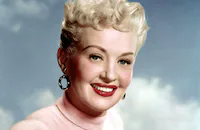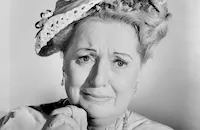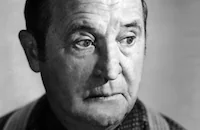Mother Wore Tights

Brief Synopsis
Cast & Crew
Walter Lang
Betty Grable
Dan Dailey
Mona Freeman
Connie Marshall
Vanessa Brown
Film Details
Technical Specs

Synopsis
In 1900, Myrtle McKinley graduates from high school in Oakland, California. Her grandparents, with whom she lives, expect her to attend business college in San Francisco but she joins the chorus at a vaudeville theater instead. There Myrtle meets singer/dancer Frank Burt, who eventually invites her to form a double act with him. They are successful together and Myrtle begins to pressure Frank to ask her to marry him. At one point, she leaves Frank to work in an act with another singer, but returns to him when she discovers she is unsuccessful without him. Frank finally proposes marriage and, as husband and wife, they tour the country in vaudeville until Myrtle becomes pregnant. She retires from the act while Frank continues with new partners. After Myrtle goes back to live with her grandmother, she gives birth to a girl, whom she names Iris, and three years later has another daughter, Mikie. A few years pass and Myrtle receives a telegram from Frank urging her to come back to the act as a replacement for a partner who has left to go into the movies. Myrtle resumes touring and the act becomes even more successful. Meanwhile, Iris and Mikie stay with Grandma and attend school, but miss their parents, whom they see only occasionally. One Christmas, when the family is separated, Grandma sends the girls to visit their parents in Boston, where they are appearing, and they enjoy the camaradarie of the entire vaudeville troupe. One summer Frank and Myrtle go on vacation with the girls at an expensive, but stuffy, summer resort filled mostly with elderly guests. However, the family soon livens the place up and Iris meets a young man, Bob Clarkman, from a society family. Later, Myrtle persuades Frank to enroll the girls in an exclusive boarding school and Iris continues to see Bob. However, she becomes embarrassed by her parents' profession and is horrified when they announce that they have arranged a booking in the town where the school is located. After Mikie chastises Iris for being ashamed of their parents, Iris tells them that she loves them but that they are so different from her friends' parents. Myrtle arranges with the school's principal to have all of Iris' classmates attend their local appearance. Their elegant act scores a big hit with everyone and Iris realizes that she has been foolish. Later, Iris becomes an honor student in the school of music, and at her graduation ceremony, which is attended by Frank, Myrtle and Mikie, she performs one of the songs her parents have long featured in their act. Iris eventually marries Bob and enters show business. Mikie also marries and every Sunday takes her children to visit their grandparents.

Director

Walter Lang
Cast

Betty Grable

Dan Dailey

Mona Freeman

Connie Marshall
Vanessa Brown

Robert Arthur
Sara Allgood

William Frawley
Ruth Nelson
Anabel Shaw
Michael Dunne
George Cleveland

Veda Ann Borg

Sig Ruman

Lee Patrick
Señor Wences

Maude Eburne
Antonio Filauri
William Forrest
Kathleen Lockhart
Lotte Stein
Chick Chandler
Kenny Williams

Frank Orth

Will Wright
Eula Morgan
Stephen Kirchner
Alvin Hammer
Harry Cheshire
Randolph Kaye
Shirley Doble
Ann Kimbell
Lee Macgregor
Brad Slaven
Ted Jordan
George Davis
Ann Gowland
Karolyn Grimes
Joan Geriens
Joseph J. Greene
Billy Green
David Thursby
Tom Stevenson
A. Robins
Eileen Robinson
Eleanor Peterson
Sue Taylor
Mary Stewart
Valerie Traxler
Esther Brodelet
Maxine Carole
Grace Davies
Nancy Hale
Marian Kerrigan
Dona La Barr
Lenore Nelems

Anne Baxter
Elaine Langan
Tom Moore
Harry Seymour
Crew
Dr. H. Warren Allen
Frank Burt
David Buttolph
Zez Confrey
Hugh Cummings
Richard Day
Leonard Doss
Seymour Felix
Fred Fisher
Anatol Friedland
L. Gallini
L. Wolfe Gilbert
Gaston Glass
Mack Gordon
Eugene Grossman
Franz Gruber
Earle H. Hagen
William Hargreaves
Roger Heman
Charles Henderson
Harry Jackson
Howard Johnson
Isham Jones
Gus Kahn
Natalie Kalmus
Charles Le Maire
Thomas Little
Imogene Lynn
Junie Mccree
Kerry Mills
Theodore Morse
Josef Myrow
Alfred Newman
Ben Nye
Orry-kelly
Maurice De Packh
Edward Powell
Gene Rose
Herbert Spencer
Herb Taylor
Urban Thielmann
Albert Von Tilzer
Lamar Trotti
Lamar Trotti
J. Watson Webb Jr.
Señor Wences
Kenny Williams
Joseph C. Wright
Darryl F. Zanuck

Film Details
Technical Specs

Award Wins
Best Score
Award Nominations
Best Cinematography
Best Song
Articles
Mother Wore Tights
Grable had begun toiling in movies as chorus girl and bit player in 1930 at the age of 13. It took her ten years and a featured part in a Broadway hit, DuBarry Was a Lady (1939), for 20th Century Fox executive Darryl Zanuck to notice her and sign her to a contract. A strong supporting role in the musical Tin Pan Alley (1940) made her a star. Grable's popularity rose steadily during World War II as she appeared in a series of successful Technicolor musicals, became the G.I's favorite pinup queen, married popular bandleader Harry James, and gave birth to her first daughter. She was one of Hollywood's top ten box office stars for ten years, starting in 1942. For eight of those years, she was the top female box-office star, and in 1943, she topped the entire list. By 1945, she was the highest paid star in Hollywood, earning nearly $300,000 a year.
Grable's career hit a few bumps after the war. Realizing that she was not a dramatic actress, she turned down a serious role in The Razor's Edge (1946)-- Anne Baxter eventually played the part and won an Oscar® for it -- but Grable's refusal so infuriated Zanuck that he put her on suspension. Fans protested when Grable's famous legs were covered in her first film after the suspension, the period musical The Shocking Miss Pilgrim (1947). The film also suffered from a lack of chemistry between Grable and her less than scintillating co-star, Dick Haymes, and did not do well at box-office.
Grable's next film, Mother Wore Tights, was also a period musical, but with plenty of leg visible, and plenty of chemistry with a new co-star, Dan Dailey. Grable reportedly wanted John Payne, with whom she'd appeared in four films. Production was delayed while the studio negotiated unsuccessfully to borrow James Cagney from Warner Bros., or Fred Astaire from MGM. By the time production finally got underway in October of 1946, Grable was pregnant with her second daughter. Finally, Zanuck settled on new Fox contract player Dailey. He proved to be a perfect partner for Grable, and they made three more films together, including When My Baby Smiles at Me (1948), which earned Dailey a Best Actor Oscar® nomination. Grable and Dailey remained lifelong friends until her death in 1973.
Mother Wore Tights was a huge hit, and earned three Oscar® nominations, for Harry Jackson's cinematography, for the song "You Do," and for Alfred Newman's musical score, which won the award. The reviews ranged from tepid to enthusiastic. The New York Times critic called it "a pretty fair song and dance show," and added, "Miss Grable in Technicolor is a balm for the eyes...Dan Dailey put a great deal of compensating personality into the tired numbers." Time called it "a trifle weak on dramatic interest," but had kinder words for the stars. "Brash Dan Dailey...has a personality as sharp and convincing as a breath of stage door air: he can really sing really dance, and really act. Miss Grable can sing too; her pleasure in playing a generous and happy woman is contagious enough to make up for her shortcomings as an actress. What she can really do, of course, is dance. And she still holds the undisputed title to the most gorgeous legs in the business."
Grable remained on top into the early 1950s, and when she began slipping, Fox groomed a new, younger blonde to succeed her, even putting the two stars in the same film, How to Marry a Millionaire (1953). With typical generosity, Grable encouraged Marilyn Monroe, saying "Honey, I've had mine. Go get yours."
Director: Walter Lang
Producer: Lamar Trotti
Screenplay: Lamar Trotti, based on the book by Miriam Burt Young
Cinematography: Harry Jackson
Editor: J. Watson Webb, Jr.
Costume Design: Orry-Kelly, Charles Le Maire
Art Direction: Richard Day, Joseph C. Wright
Music: Alfred Newman, Charles Henderson
Cast: Betty Grable (Myrtle McKinley Burt), Dan Dailey (Frank Burt), Mona Freeman (Iris Burt), Connie Marshall (Mikie Burt), Vanessa Brown (Bessie), Robert Arthur (Bob Clarkman), Sara Allgood (Grandmother McKinley), William Frawley (Mr. Schneider), Ruth Nelson (Miss Ridgeway).
C-107m.
by Margarita Landazuri

Mother Wore Tights
Quotes
Trivia
Notes
Although Hollywood Reporter production charts place Almira Sessions in the cast, her participation in the released film has not been confirmed. According to documents in the Twentieth Century-Fox Records of the Legal Department and the Twentieth Century-Fox Produced Scripts Collection at the UCLA Arts-Special Collections Library, in October 1945, the studio purchased rights to Miriam (Mikie) Young's biography of her parents for $23,000. Frank A. Burt, born Augustus Berek, and Myrtle McKinley enjoyed long careers in vaudeville as Burt and Rosedale. In a September 1946 press release found at the AMPAS Library, the studio announced that Peggy Ann Garner would play "Iris Burt," the role Mona Freeman eventually played. Some contemporary reviews list the character portrayed by Ruth Nelson as "Miss Ridgeway," although the screenplay refers to her as "Miss Ridgway." Alfred Newman won an Oscar for Best Scoring of a Musical Picture for Mother Wore Tights. The song "You Do" was nominated for Best Song and Harry Jackson received a nomination for his color cinematography. A radio adaptation of Mother Wore Tights, starring Betty Grable and Dan Dailey, was broadcast on Lux Radio Theatre on February 2, 1948. The screenplay was also adapted for broadcasts in 1949 and 1955. Mother Wore Tights preserves on color film part of the classic act of ventriloquist Señor Wences.














